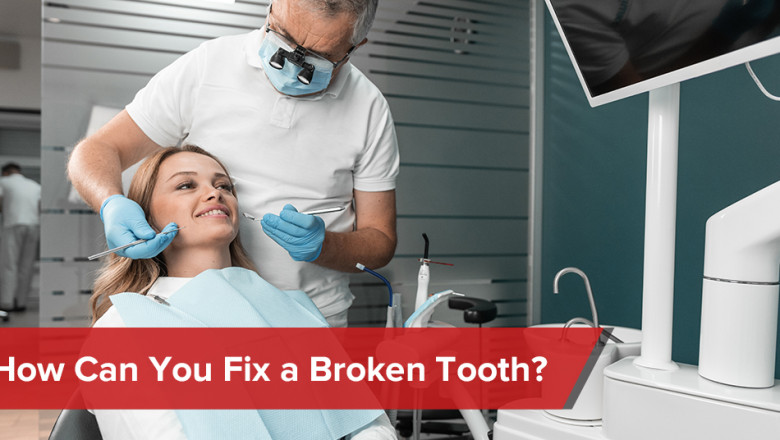views
A broken tooth can be painful, inconvenient, and costly to repair. Whether it’s a small chip or a severe fracture, dental injuries can impact your smile, chewing ability, and overall oral health. Understanding the common causes of broken teeth can help you take preventive measures to protect your teeth and avoid unnecessary dental treatments. In this article, we will explore five of the most frequent causes of broken teeth, discuss broken tooth repair options, and provide practical tips on how to prevent them.
1. Biting Down on Hard Foods or Objects
One of the leading causes of broken teeth is biting down on hard foods or objects. Ice cubes, hard candies, nuts, and even unpopped popcorn kernels can exert excessive pressure on your teeth, causing them to crack or break. Many people also have the habit of using their teeth as tools to open bottles, rip packaging, or cut objects, which can lead to dental fractures.
How to Avoid It:
-
Avoid chewing on hard foods, especially if you have weak or previously restored teeth.
-
Use proper tools instead of your teeth for opening or cutting objects.
-
Be mindful of hidden hard substances in foods, such as bone fragments in meat or unpopped kernels in popcorn.
-
If you have a history of dental issues, consider consuming softer alternatives to hard foods.
2. Accidents and Trauma
Accidents, falls, and physical impacts are another major cause of broken teeth. Whether it’s a sports injury, a car accident, or a simple slip-and-fall, sudden trauma can cause teeth to chip, crack, or completely break.
How to Avoid It:
-
Wear a mouthguard when engaging in contact sports such as football, basketball, or boxing.
-
Always use a seatbelt while driving to minimize the risk of facial injuries in case of an accident.
-
Be cautious on slippery surfaces to prevent falls.
-
If you grind your teeth at night, consider wearing a nightguard to prevent damage caused by unconscious clenching.
3. Tooth Decay and Weak Enamel
Tooth decay weakens the structure of the tooth, making it more susceptible to fractures. Cavities, if left untreated, can cause the tooth to deteriorate from the inside out, leading to cracks or complete breakage. Additionally, some individuals have naturally weaker enamel due to genetics, poor oral hygiene, or acid erosion.
How to Avoid It:
-
Brush and floss daily to remove plaque buildup and prevent cavities.
-
Visit your dentist regularly for check-ups and professional cleanings.
-
Limit sugary and acidic foods and beverages that contribute to enamel erosion.
-
Strengthen your teeth by using fluoride toothpaste or undergoing professional fluoride treatments if recommended by your dentist.
4. Teeth Grinding (Bruxism)
Bruxism, or teeth grinding, is a common but often overlooked cause of broken teeth. Many people grind their teeth unconsciously, especially during sleep, which places excessive stress on the enamel and can lead to fractures over time. Chronic teeth grinding can also cause jaw pain, headaches, and worn-down teeth.
How to Avoid It:
-
If you suspect you grind your teeth, consult a dentist for an evaluation.
-
Wear a custom-fitted nightguard to protect your teeth while sleeping.
-
Practice stress-reducing techniques such as meditation or deep breathing, as stress is a common trigger for teeth grinding.
-
Avoid caffeine and alcohol before bedtime, as they can increase the likelihood of grinding.
5. Large Fillings or Previous Dental Work
While dental restorations such as fillings, crowns, and root canals are meant to repair and strengthen teeth, they can sometimes weaken the tooth’s structure if not properly maintained. Large fillings, especially those that cover a significant portion of the tooth, can make it more prone to breaking under pressure.
How to Avoid It:
-
Schedule regular dental visits to monitor the condition of existing fillings and dental work.
-
If you experience discomfort or sensitivity in a filled tooth, consult your dentist to ensure the restoration is intact.
-
Consider stronger restorative options such as crowns or onlays if a filling is too large and weakens the tooth.
Conclusion
A broken tooth can be an unpleasant experience, but with the right precautions, you can minimize your risk. By avoiding hard foods, protecting yourself from accidents, maintaining good oral hygiene, addressing teeth grinding, and properly caring for dental restorations, you can keep your teeth strong and healthy. If you ever experience a broken tooth, seek professional dental care as soon as possible to prevent further complications. Emergency Dental 365 is available to provide prompt care when you need it most. Prioritizing your dental health today will save you from pain and costly treatments in the future.














Comments
0 comment